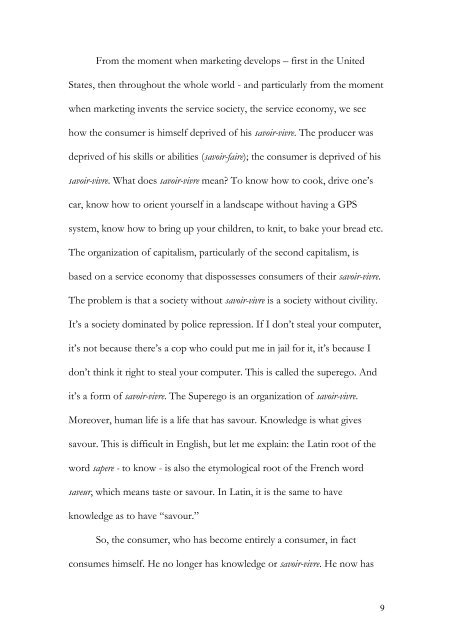Crogan, P. (2010) Knowledge, care and trans-individuation: An in ...
Crogan, P. (2010) Knowledge, care and trans-individuation: An in ...
Crogan, P. (2010) Knowledge, care and trans-individuation: An in ...
Create successful ePaper yourself
Turn your PDF publications into a flip-book with our unique Google optimized e-Paper software.
From the moment when market<strong>in</strong>g develops – first <strong>in</strong> the United<br />
States, then throughout the whole world - <strong>and</strong> particularly from the moment<br />
when market<strong>in</strong>g <strong>in</strong>vents the service society, the service economy, we see<br />
how the consumer is himself deprived of his savoir-vivre. The producer was<br />
deprived of his skills or abilities (savoir-faire); the consumer is deprived of his<br />
savoir-vivre. What does savoir-vivre mean? To know how to cook, drive one’s<br />
car, know how to orient yourself <strong>in</strong> a l<strong>and</strong>scape without hav<strong>in</strong>g a GPS<br />
system, know how to br<strong>in</strong>g up your children, to knit, to bake your bread etc.<br />
The organization of capitalism, particularly of the second capitalism, is<br />
based on a service economy that dispossesses consumers of their savoir-vivre.<br />
The problem is that a society without savoir-vivre is a society without civility.<br />
It’s a society dom<strong>in</strong>ated by police repression. If I don’t steal your computer,<br />
it’s not because there’s a cop who could put me <strong>in</strong> jail for it, it’s because I<br />
don’t th<strong>in</strong>k it right to steal your computer. This is called the superego. <strong>An</strong>d<br />
it’s a form of savoir-vivre. The Superego is an organization of savoir-vivre.<br />
Moreover, human life is a life that has savour. <strong>Knowledge</strong> is what gives<br />
savour. This is difficult <strong>in</strong> English, but let me expla<strong>in</strong>: the Lat<strong>in</strong> root of the<br />
word sapere - to know - is also the etymological root of the French word<br />
saveur, which means taste or savour. In Lat<strong>in</strong>, it is the same to have<br />
knowledge as to have “savour.”<br />
So, the consumer, who has become entirely a consumer, <strong>in</strong> fact<br />
consumes himself. He no longer has knowledge or savoir-vivre. He now has<br />
9

















